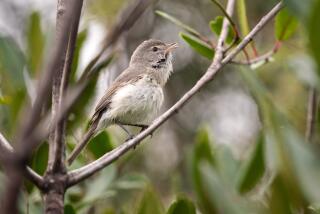Closeness to City Cited by Naturalists : Wildlife Area Sought Near Buenos Aires
- Share via
BUENOS AIRES — A grandiose high-rise development project of the former military government is now a place where wild ducks and swans swim among lily pads and migrating swallows swoop over pastures and thick stands of trees.
It is a near-wilderness on Buenos Aires’ riverfront a stone’s throw from the city’s business district.
Argentina’s economic problems have kept the high-rise buildings from going up.
The abandoned 960-acre tract, created out of mud dredged from the River Plate, has become home to a wide variety of wildlife and a rallying point for naturalists who want it declared a wildlife refuge.
Its location is part of the reason environmentalists want to see it preserved.
‘Tremendous Potential’
“Our main argument is that it has a tremendous educational potential, being so close to the city,” Gustavo Ramirez, president of the Argentine chapter of Friends of the Earth, said.
“You would have to go at least 80 or 100 kilometers (50 or 60 miles) outside the capital to find anything like it.”
The original project was the idea of Osvaldo Cacciatore, an air force general installed as mayor by a military junta that took power in March, 1976.
It was one of many ambitious and costly projects launched by Cacciatore, who once announced plans to construct a hollow 600-foot-tall concrete cross with a built-in snack bar on the river itself as a symbol of Argentina’s Roman Catholic heritage. It was never built.
Land reclamation has been in practice in Buenos Aires since the city was founded in 1580. Many of its office towers, apartment buildings and its entire port system stand upon fill that was dumped along the 10 miles of riverfront.
Seeing a need for more expansion, Cacciatore picked an area known as the costanera sur (south bank). A once-elegant beach area with a mile-long promenade, it had fallen into disuse as industrial pollution spoiled the river for swimming.
Satellite City
The former mayor envisoned a self-contained satellite city off the old waterfront, built upon sludge from dredgers that continually maintain the channel to the port of Buenos Aires.
The new tract would contain homes, shops, offices and everything its inhabitants needed, Cacciatore announced when the project was launched in the late 1970s. He said many municipal agencies would move their offices there.
The mud landfill was started, but the project came to a halt when the economy took a plunge in 1981.
Left behind was a desolate expanse of lagoons, marsh and pasture, but it didn’t remain barren for long.
“Because the fill came from the river, it represented a soil typical to the area. Local plants, such as tall grass found in the pampas, flourished in it,” Ramirez said.
Birds were attracted by the spreading vegetation and by the plentiful water which, because it is protected from polluted river currents, is of drinking quality. Fast-growing local willow trees spread across dozens of acres and shot as high as 20 feet.
Swallows’ Stopover
Naturalists say they have spotted 180 species of birds, including black-neck swans, wild duck, grebes, herons, egrets and hummingbirds. It has become a stopover for the migrating swallow that spends the southern winter on the U.S. West Coast--notably Capistrano in California--and travels south in the southern summer to nest in Argentina.
Ramirez’s River Plate Ornithological Society and the National Wildlife Foundation persuaded the city council last September to approve a resolution starting the process of having the area declared a park.
Another vote will be required after a city ordinance is drafted, which is expected to take about a year.
Some city legislators and private contractors oppose the park plan, contending that the land is needed for housing or other development. But, with the economy still stagnant, funding is not avialable for reviving the project.
“It’s ironic, but it’s lucky for us there is no money,” said Friends of the Earth member Carlos Estevez. “If there was money, there’d be no park.”
More to Read
Sign up for Essential California
The most important California stories and recommendations in your inbox every morning.
You may occasionally receive promotional content from the Los Angeles Times.













